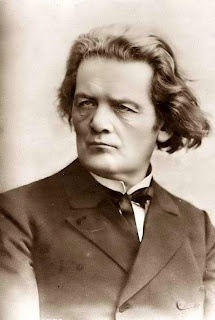Information
Composer: Anton Rubinstein
- Symphony No. 4 in D minor "Dramatic", Op. 95: I. Lento - Allegro moderato
- Symphony No. 4 in D minor "Dramatic", Op. 95: II. Presto
- Symphony No. 4 in D minor "Dramatic", Op. 95: III. Adagio
- Symphony No. 4 in D minor "Dramatic", Op. 95: IV. Largo - Allegro con fuoco
Robert Stankovsky, conductor
Date: 1990
Label: Naxos
http://www.naxos.com/catalogue/item.asp?item_code=8.223319
----------------------------------------------------------------
The Fourth is probably the best of Rubinstein’s Symphonies. Written in 1874 it’s a deeply uneven and ultimately unconvincing work but contains enough perplexing turbulence to elevate it far beyond the merely decorative, beyond the post Mendelssohnian symphonic statement. If it never reaches the heights of a genuine Romantic crisis symphony it contains intriguing material sufficient to warrant more than a second hearing and this Naxos issue, first issued on Marco Polo 8.223319 in 1991, provides just such an opportunity.
The First Movement opens with angular and forbidding string writing. A more exultant theme enters followed soon by a compelling species of orchestral winding-down before an explosion in a unison string outburst of genuine outpouring – a moment of deeply remarkable writing and one that seems to strain the symphonic form in which it is housed. Striving and eloquent strings follow, over a dancing pizzicato, as Rubinstein tries out his theme in differing orchestral colours and guises. Certainly the thematic material is over-repeated and it’s also somewhat underwhelming in its melodic presumptions but there are some marvelous touches – at 17’50 for example where the delicacy of the string writing shades into solos for flute, clarinet and bassoon. The conclusion of the movement reveals a little orchestral untidiness from the otherwise well-equipped Slovak Orchestra. The Presto contains some very oppositional writing though nothing as volcanic as the earlier movement. From stern unison string writing and mellow winds some jovial violin figures lead onwards to lashing animation and a melody of decisive force – the solo violin passage over ostinato basses adding another voice to the rich orchestral patina. Some of this is rather reminiscent of Raff and early Dvořák.
The Adagio is a freely moving slow movement in which strings and wind vie for dominance. The long string melody – attractive and persuasive – is later enlivened by exchanges between flutes and the warmth of the divided string section. The finale picks up the quivering angularities of the opening movement. Its turbulence is a classical mirror of the First Movement’s divergences and disjunctions. Piccolo is prominent, fractious brass increasingly so; a sturdy second theme, in F Major, and a wind episode are both of charming vivacity and impel the conclusion, which is both colourful and confidently triumphant. A decade on the Slovak State Philharmonic performance holds up well; some imprecision, a lack of string heft sometimes. But Stankovsky has a good sense of the trajectory of Rubinstein’s imaginative writing and guides us well and resolutely. There is at least one rival – Russian Disc RDCD 11357 with the Russian State Symphony Orchestra conducted by Igor Golovchin and released in 1995, which I’ve not heard. But Stankovsky’s is a welcome return to the catalogue at budget price and heartily recommended.
-- Jonathan Woolf, MusicWeb International
More reviews:
----------------------------------------------------------------

Anton Grigorevich Rubinstein (November 28 [O.S.November 16] 1829 – November 20 [O.S. November 8] 1894) was a Russian pianist, composer and conductor who became a pivotal figure in Russian culture when he founded the Saint Petersburg Conservatory. He was the elder brother of Nikolai Rubinstein who founded the Moscow Conservatory. As a pianist, Rubinstein ranks amongst the great 19th-century keyboard virtuosos. Rubinstein was also a prolific composer throughout much of his life.
http://en.wikipedia.org/wiki/Anton_Rubinstein
http://en.wikipedia.org/wiki/Anton_Rubinstein
***
Robert Stankovsky (August 5, 1964 - January 6, 2001) was a Slovakian conductor. Till January 2001 he was active as the principal conductor of Slovak Radio Symphonic Orchestra as well as a conductor of the Czech Philharmonic Orchestra, the Prague Symphony Orchestra and the Cologne Radio Orchestra.. He had recorded 36 CDs, most of them for Marco Polo and Naxos.
http://www.naxos.com/person/Robert_Stankovsky/31875.htm
http://www.naxos.com/person/Robert_Stankovsky/31875.htm
----------------------------------------------------------------
FLAC, tracks
Links in comment
Enjoy!


This comment has been removed by the author.
ReplyDeleteMEGA
Deletehttp://adf.ly/1ZJLf7